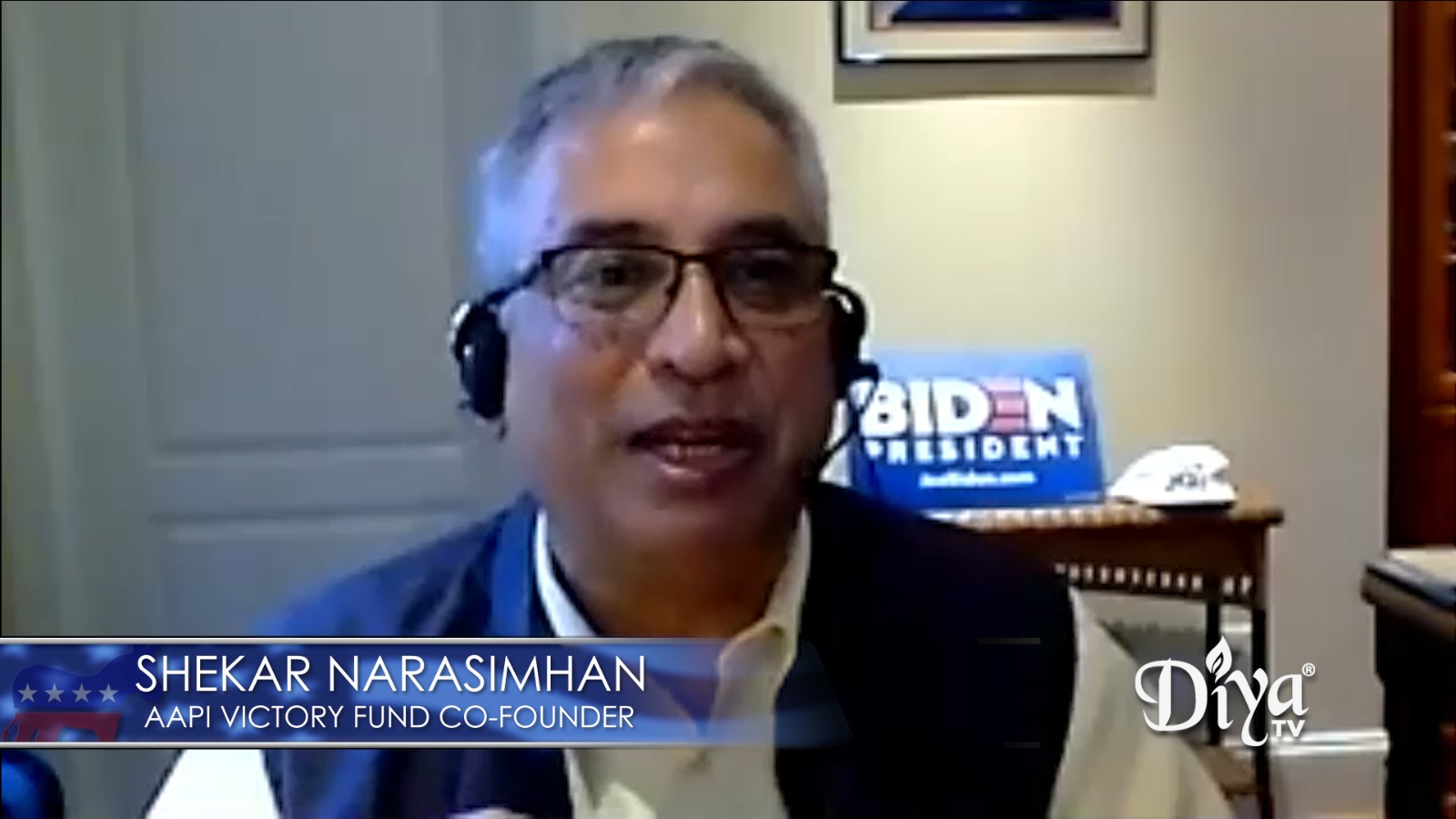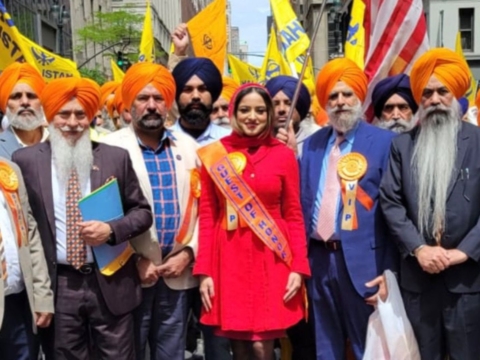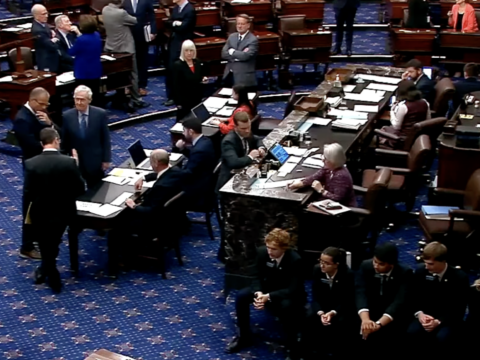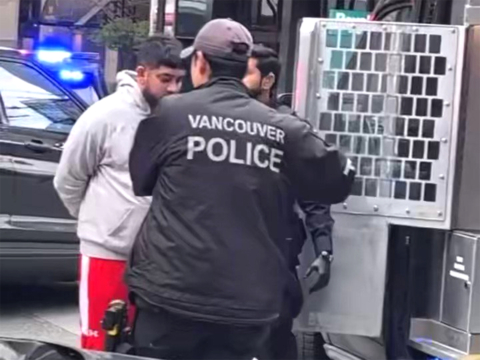Ravi Kapur: Hi everyone, I’m Ravi Kapur. Welcome to our coverage of the Democratic National Convention virtual style. Shekar Narasimhan who is one of the co-founders of the AAPI victory fund. It’s been an emerging Super PAC in recent years trying to get Asian Americans to vote for Democratic candidates, and of course we have penultimate Asian American candidates in this cycle. Senator Kamala Harris has a chance to be the first Vice President of the United States that is of Asian American descent and South Asian descent more specifically. Mr. Shekar it is always great to see you. Tell us about your ground game this year. I know in 2016 we were there firsthand to see all of your events that you did throughout the country, and you certainly had some big ones in Las Vegas and then you had forums everywhere. What is different about 2020 besides the pandemic? Has that just completely shifted your approach to get voters to turn out?
Shekar Narasimhan: Hi Ravi, it’s good to see you and to talk to your viewers. It’s an exciting time for us. It’s you know, if you have any political bone in your body, it’s an exciting time. If you care about this country it’s an urgent time. The things we need to do and we need to do them and we need to make a lot of things right after November third. So first you have to win an election. So what’s different first of all from 2016? Two very critical things, one gets overlooked because of the pandemic, and the most important to me in 2016, is that a whole bunch of people in our community woke up and decided that they wanted to take some civic action.
SN: And whether they marched in the women’s march on the Sunday after the inauguration, whether it was getting involved with Indivisible and groups associated with grassroots organizing. All of a sudden we have seen this proliferation of organizations. Women’s groups, young people, and even frankly the uncles and aunties groups that have gotten organized and we saw evidence of it in 2018. So how do we know it exists and how valuable it is. In 2018 when the Democrats won 46, many of those flips that occurred because of Asian American votes. But many of the places where we got close like in Texas or because of Asian American votes. As an example the Indian American turn out between 2018 and 2014 increased by 20%.
SN: So when we start to look at data like that and we assemble those groups, we’ve had conversations, we’ve talked about how they can work together so that in Michigan, and Pennsylvania, in Texas, in Ohio, in North Carolina, these groups can be organized, reaching more people because they have more volunteers, more energy, more sophistication than we had four years ago. That’s a big difference, and then you activate the pandemic. Which is why we are doing everything possible. There’s points and times where it is uncomfortable, but most of us don’t really ever learn to deal with it and to be safe during it, but most importantly we have learned how to find silver linings in the cloud.
SN: One of the silver linings is that so many of our community members are sitting at home. They have time, so we’re trying to utilize that more efficiently. How do we provide them with a list of phone numbers to call, a list of names, languages that they speak that can be utilized in just connecting with borders. So the answer is we’re all digital today. We are much more data driven even than we were four years ago. There are many more people doing this and it’s our job to make it cohesive and organized to message this right, leave no board behind. Fight for every single board, every single place, and specifically in the battlegrounds make sure you’re talking to the constituencies in a culturally appropriate manner. That’s our plan.
RK: You make a great point about data and being able to flush out where the voters are in by district. Tell us about your ground gae. Obviously you have this umbrella organization trying to reach Asian Americans, and certainly we fully understand it’s difficult, sometimes to reach folks where they are. There are language efforts. I’ve seen the census 2020 outreach which is quite extensive. They’ve spent hundreds of millions of dollars in marketing and they still can’t get 100% of falks to respond to the census. So tell us about what you’re planning to do and what you have been doing here in 2020 and how much of your plan was altered by the pandemic.
SN: The main thing is the kickoff for us was in january, we made a decision along with a number of other people on President’s Day 2019 that this community and our communities have grown up and that the numbers are significant in terms of votes. We had to take a stand even during the presidential primary. So we endorsed Joe Biden on January 18th before the Iowa caucuses after meeting him and six other of the presidential candidates. Judgement was based on a first time ever poll that said if you looked at the Asian American electorate, who they preferred as their nominee, their number one choice was Joe Biden. The second thing that guided it was that in every scenario we ran, the highest probability of defeating Donald Trump was Joe Biden, and that’s why we endorsed him. Now once you endorse somebody you’re supposed to do something with that; words are good but actions speak louder.
SN: We did an event in Las Vegas, which was one of the most pivotal events during the campaign because it was very well attended, plenty of people there, lots of enthusiasm. And the good news was that he then emerged from South Carolina after 5 days as the sort of frontrunner if you will. Our goal then became how do we help organize Michigan? How do we help organize to North Carolina and Virginia? Get ready for the general election now.
SN: So what is the ground game? The Ground game is thousands of people with appropriate information about contact list persuasion, messages, knowing that you can reach people where they are I.E. telephone. Telephones are working today, it didn’t work four years ago because everybody was switching to cell phones. People are picking up their phones. The first thing you should say is “How are you doing? How is your family doing? How’s everybody holding up in the midst of this?”
SN: This is unprecedented and it’s global. So first compassion, empathy is second in line with skills. If you’re talking Gujarati to a Gujarati person, particularly an older person, it makes an impact and a difference. It says “I knew who you were when I called you, and I can associate with you”
SN: Third, the message is that we have a strong ticket that has a plan to rebuild America better, that has a plan to restore dignity and honor and character in the White House, and a plan to ensure that every American is lifted up, including you, including your children, including your family. Before getting the specifics, if you hit those points, you do it on WhatsApp, you do it in any other medium you choose to, use email, adjust a phone call, message a zoom call, do it in small groups. We are encouraging people to do it and thousands of these efforts are occurring as we speak today because there are thousands of volunteers mobilized, energized, and ready to go to work. So the ground game is simple, touch as many people as you can, then make sure, and Ravi when we started I said to you the challenge now is to encourage people to figure out how they’re going to vote and make sure that their vote is counted. The most important thing in any election is getting people up in the morning on Election Day and rousting them up, reminding them because many people have jobs, and lives, and children and obligations, and say “Today is the day that you have to vote.”
SN: This election starts on September the 14th. People keep saying that we have 87 days and that we’re counting the clock, but it starts on September 14th. The first state in the Union for early voting is Arizona on September 14th, and then it’ll continue every day in a new event and new State. So what should we do? Show people. How do you get an absentee ballot? 76% of American’s can vote by mail today, many of them in these states that really matter electorially will be really close. Michigan as an example, we lost Michigan last time. Hilary Clinton lost to Donald Trump by two votes per precinct. Two votes. The Indian American population alone, leave aside the AAPI population, if they had come out at the same level as the general population, it was about four votes per precinct. Does your vote make a difference? Yes it does. Explain these things to people to get to them. And yes, you will hear the noise, you will hear disinformation. You’ll hear “Didn’t Joe Biden do this, and Kamala Harris say this.” Be prepared, engage yourself first and get yourself up to snuff.
SN: Also be prepared to say we don’t agree. That’s okay, but still who is going to be better in this position in the White House on January 21st for you and my family. And if you can persuade them, do so. Start tomorrow, join one of these volunteer groups. There are five or six of them that are really well organized. Get going, make your argument because if you make it to yourself and your family you can make it to your friend and to this network.
RK: Shekar, I’ve heard for a number of years now, especially amongst folks like yourself that they are trying to get Asian Americans to get out to vote, that Asian Americans are the swing vote. Is that truly the case, and are there verticals within the AAPI community? Let’s say Indian Americans, Vietnamese Americans, Chinese Americans, are they integral to helping one party or the other capture said community, to put them over the hump in November?
SN: We knew in 2016 that Virginia and North Carolina and Nevada the AAPI work was the difference between winning and losing. There isn’t a single candidate referral on the state level in the places where there are congregations in AAPI communities that don’t know that today. So every candidate in Nevada in a five seven 10% APR district knows you better have an AAPI outreach program. You probably need somebody that looks like your district on your team and you better be doing mailings in language.
SN: What’s happened this year? The map is different. Not that Virginia is safe, or Nevada is safe or Colorado is safe, but that they are more likely in the Democratic call. But where the map has shifted is where we have Florida, Texas, Georgia, North Carolina, southern states that have significant numbers of AAPI’s that are non voters. Let me give you an example in the Indian American context. In the Indian American context, and by the way Pakistani Americans and Bangladeshis are more unique in the sense that they were undervoting. You still have a number of communities that have to find out if you got a hundred votes on the 200 eligible voters and 70% of them register to vote. It would be fantastic, but our community has been 50% in the past.
SN: So you have to do two things. You have to get people to become citizens. Guess what? Asian AAPIs overtook Mexicans in naturalization starting in 2018. We know I’m becoming more of a citizen, so when people ask me if the AAPI community is the Sikh community welcome to this election, I say yes. Just by the quantity of emails, and this is before Kamala Harris was put on the ticket. Is three enthusiasm? Yes. Is there ambition and drive with some real passion behind it? Yes, but it needs to be channeled. You have to not only have people talk about these in cocktail parties, you have to have them do something to have five more people register to vote and vote for your candidate.
SN: If you believe passionately in the future and your children, that’s what you would do. So that’s what we listen to. There is the energy we had with thousands of people at our event on Saturday on Friday night. So when you get communities like the Indian Americans, Pakistani Americans, Vietnamese Americans, Korean Americans, CHinese Americans, Filipino Americans. Filipino Americans for Biden alone have a thousand people on the list chatting with each other every day.
SN: Channel this. Make it count. Make it count in a sophisticated manner about reaching people and getting them to register, learning the ropes of absentee voting and vote by mail and make sure their vote is counted.
RK: The selection of Senator Harris as Vice President, how integral is that to get Asian Americans to vote for the Democratic ticket? Because as you mentioned, you selected to endorse Vice President Biden many months ago. You did not pick Senator Harris, you did not take Andrew Yang and other AAPI presidential candidates. So tell me about having Senator Harris on the ticket. Is that a jolt of energy? Is that an absolute path to victory for the Democrats in November? Take us through that and then some of the calculations you made when you decided to endorse Vice President Biden.
SN: Getting Kamala Harris on the ticket was first and foremost emotional. I like to use a Hindi saying, anything that you really care about deeply you’re going to have fun mun and done, which means your heart, your mind, and your wallet. You got to have all three to make something really exciting and passionate. Could you have dreamt coming to this country, and I came to this country as an immigrant, that somebody who is the daughter of somebody from India, who had been to India, who had a heritage in would become the nominee as Vice President of the United States. I dreamt about it, we talked about it, but the fact is very extraordinarily emotional.
SN: Does that mean that people get out and vote again? No, because again translate these things, channel that. What does she bring to the ticket beyond the emotional reaction that she is a black woman with an Indian heritage. What she brings to the tickets is that she’s smarter than heck, is charismatic, and a great speaker. She clearly is not only well suited but capable of the job. She can excite donors and fundraising can accelerate and finally and most importantly, she will make a great partner for Joe Biden, and they complement each other beautifully. So from every aspect, emotional and otherwise, all i can say is it is absolutely spectacular, so it’s a win for the community. Think about the importance of the selection for you and your children. Think about the ticket that has been assembled under judgement that was made by the Vice President that said I need this person running with me. And when you look at the judgments exercised and the person he brought you should say to yourself, I should do every single thing in my power to make sure that these people get elected.
SN: FInally look at the number of people he has around him and the diversity of his campaign, the promises he has made about diversity and the integration and inclusion of all Americans are the same here. Honestly in the last two years there have been times that I felt I was a foreigner in my own country.
SN: And I wonder, will my children and my grandchildren have to go through this too? Will they have to feel this way, that we came here but we don’t really belong no matter what. We contribute to pay taxes. Not with Joe Biden, not with Kamala Harris. Just look at the picture of the two of them. I feel I’m already part of this. It’s part of what America is, I want them in fron. I want to become a role model for my grandchildren. So please everybody, don’t stop working even if we win because there’s a lot of work to be done after that to build back this country and bring it back much better than it used to be.
RK: Shekar, my last question for you, since we have a lot of folks that are honing in on Harris’s South Asian heritage for Indian American identity, tell us what the game plan will be to reach Indian Americans who are skeptical about the Biden Harris ticket and their outreach to India, especially in light of what’s going on. We have had the Kashmir issue flare up in the last year. We’ve had the border conflict between India and China. We see the U.S. China relations that have been strained the last few years. All these economies are taking place, people in the community are talking and President Trump as you well know had a large event last Fall in Houston with 50,000 Indian Americans waving him on, we have never seen anything quite like that. Obviously there’s a huge advantage to Kamala Harris being of Indian descent,and as you said the proof is in the pudding. What kind of actions is the Senator going to be doing,and what actions will you be doing to talk about these issues, because there are sensitivities in the community at large who are very concerned about where India will be moving forward if the Biden administration takes place , and the role if you want to go down the religious tract. Certainly we’ve seen the Biden campaign have a Muslim American platform, we have not seen anything yet for Hindu or Sikh Americans. So can you speak to some of that?
SN: That’s why we are reaching out. That’s why we have told the campaign that they must speak to our community questions. You must be outfront. I personally know how to equate the Muslim American issue with the Indian American issue because I mean there are also plenty of Indian Americans that are Muslims or Sikhs. I can see that the vast majority of Indian Americans are Hindu, and I get that, but there’s a generation issue here. Many of us who came to this country brought with us our natural inclinations from India and our biases, plusses and minuses, it always works that way. Children and their grandchildren are different. So first of all, i think that let’s be very clear, actions speak louder than words, i’ve said that before
SN: Donald Trump went on the stage because Modi was there. Modi got the 50,000 people to join the party. Every President has been to India at least once, if not twice during that job. Why is this a bipartisan relationship? Who helped pull the Indo US nuclear treaty over the line in the U.S. senate? It was Joe Biden. Who was the chairman of the Foreign Relations Committee at the point that they started to discuss the strategic value and importance in the relationship? That was Joe Biden. So on Saturday we put out a fact sheet on campaign day that said what do the U.S. India relations look like? How do Indian Americans fair in a Joe Biden administration? It is pages long and covers every subject. Does this mean that we won’t have disagreements? Of course not. There’s going to be tough conversations about issues all the time. India’s not going to agree with the U.S. all the time, and sometimes it’s due to a misunderstanding. So what we can do to address this is to put the top people on the stage and tell them to answer these questions.
SN: Right now you have President Trump who has cut off H1B visas, who has put trade tariffs on India. You want this guy to be your president? The guy who is shutting down the borders and closing the door? Or do you want a President who’s inclusive, wants the economy to grow for everyone, who wants everyone to have justice. That’s why I’m voting for Joe Biden and Kamala Harris, and I think Kamala’s pick takes it over the top for me, it was the icing on the cake to me.




